ENTR101: Entrepreneurship Report - Ventures, Impact, and Traits
VerifiedAdded on 2020/01/23
|13
|4568
|156
Report
AI Summary
This report provides a comprehensive overview of entrepreneurship, exploring various types of entrepreneurial ventures, including small, micro, and large businesses. It analyzes the impact of these ventures on the economy, emphasizing job creation, innovation, and economic growth. The report details the characteristics and traits of successful entrepreneurs, such as unwavering dedication and open-mindedness, and discusses how personal backgrounds influence entrepreneurial motivation. Furthermore, it examines the scope, development, and growth of entrepreneurial ventures, highlighting their role in national and international economies. The report also covers the similarities and differences between small and large businesses, their objectives, and their contributions to the economy. This report is a valuable resource for students studying entrepreneurship, offering insights into the key concepts and practical applications of entrepreneurial principles.

UNDERSTANDING
ENTREPRERSHIP
ENTREPRERSHIP
Paraphrase This Document
Need a fresh take? Get an instant paraphrase of this document with our AI Paraphraser
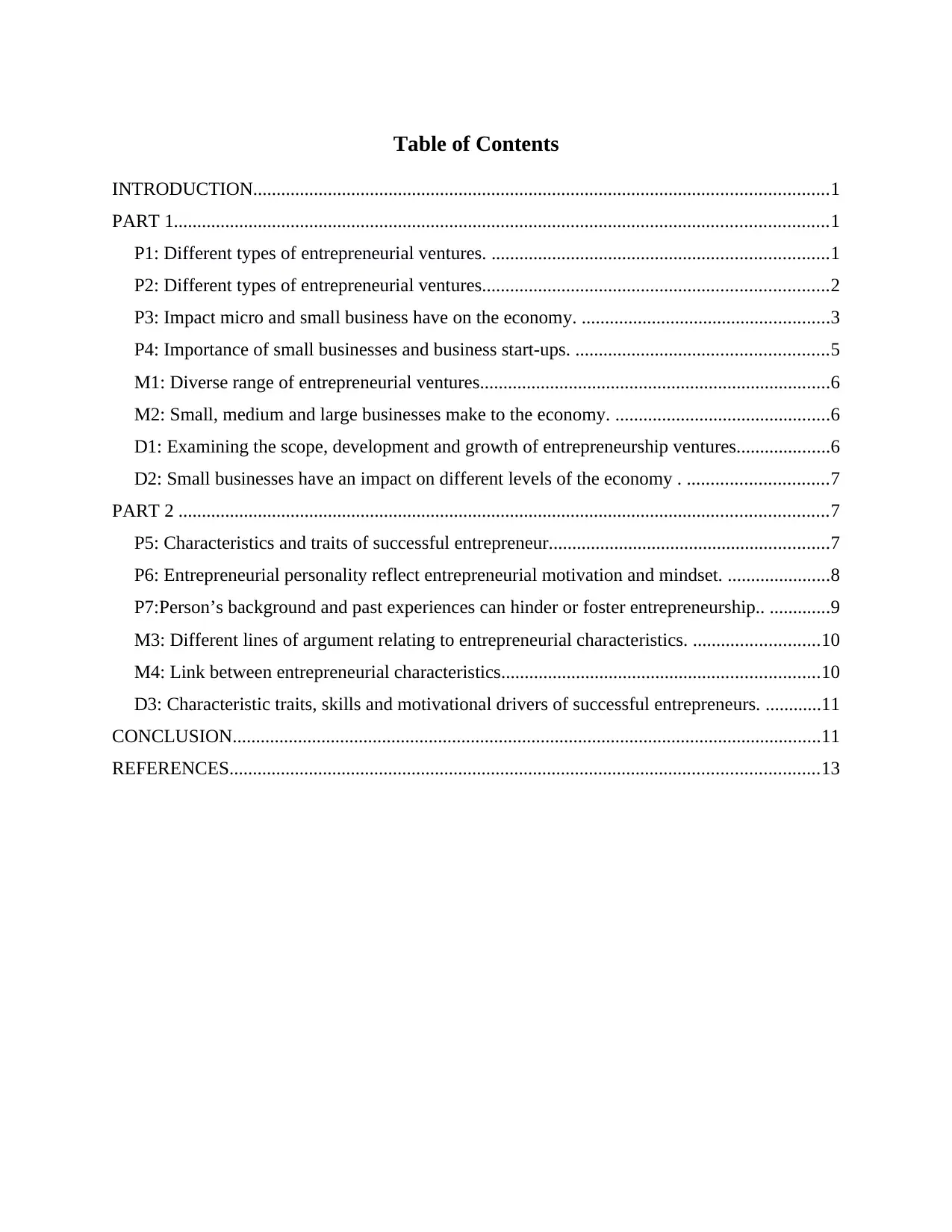
Table of Contents
INTRODUCTION...........................................................................................................................1
PART 1............................................................................................................................................1
P1: Different types of entrepreneurial ventures. ........................................................................1
P2: Different types of entrepreneurial ventures..........................................................................2
P3: Impact micro and small business have on the economy. .....................................................3
P4: Importance of small businesses and business start-ups. ......................................................5
M1: Diverse range of entrepreneurial ventures...........................................................................6
M2: Small, medium and large businesses make to the economy. ..............................................6
D1: Examining the scope, development and growth of entrepreneurship ventures....................6
D2: Small businesses have an impact on different levels of the economy . ..............................7
PART 2 ...........................................................................................................................................7
P5: Characteristics and traits of successful entrepreneur............................................................7
P6: Entrepreneurial personality reflect entrepreneurial motivation and mindset. ......................8
P7:Person’s background and past experiences can hinder or foster entrepreneurship.. .............9
M3: Different lines of argument relating to entrepreneurial characteristics. ...........................10
M4: Link between entrepreneurial characteristics....................................................................10
D3: Characteristic traits, skills and motivational drivers of successful entrepreneurs. ............11
CONCLUSION..............................................................................................................................11
REFERENCES..............................................................................................................................13
INTRODUCTION...........................................................................................................................1
PART 1............................................................................................................................................1
P1: Different types of entrepreneurial ventures. ........................................................................1
P2: Different types of entrepreneurial ventures..........................................................................2
P3: Impact micro and small business have on the economy. .....................................................3
P4: Importance of small businesses and business start-ups. ......................................................5
M1: Diverse range of entrepreneurial ventures...........................................................................6
M2: Small, medium and large businesses make to the economy. ..............................................6
D1: Examining the scope, development and growth of entrepreneurship ventures....................6
D2: Small businesses have an impact on different levels of the economy . ..............................7
PART 2 ...........................................................................................................................................7
P5: Characteristics and traits of successful entrepreneur............................................................7
P6: Entrepreneurial personality reflect entrepreneurial motivation and mindset. ......................8
P7:Person’s background and past experiences can hinder or foster entrepreneurship.. .............9
M3: Different lines of argument relating to entrepreneurial characteristics. ...........................10
M4: Link between entrepreneurial characteristics....................................................................10
D3: Characteristic traits, skills and motivational drivers of successful entrepreneurs. ............11
CONCLUSION..............................................................................................................................11
REFERENCES..............................................................................................................................13
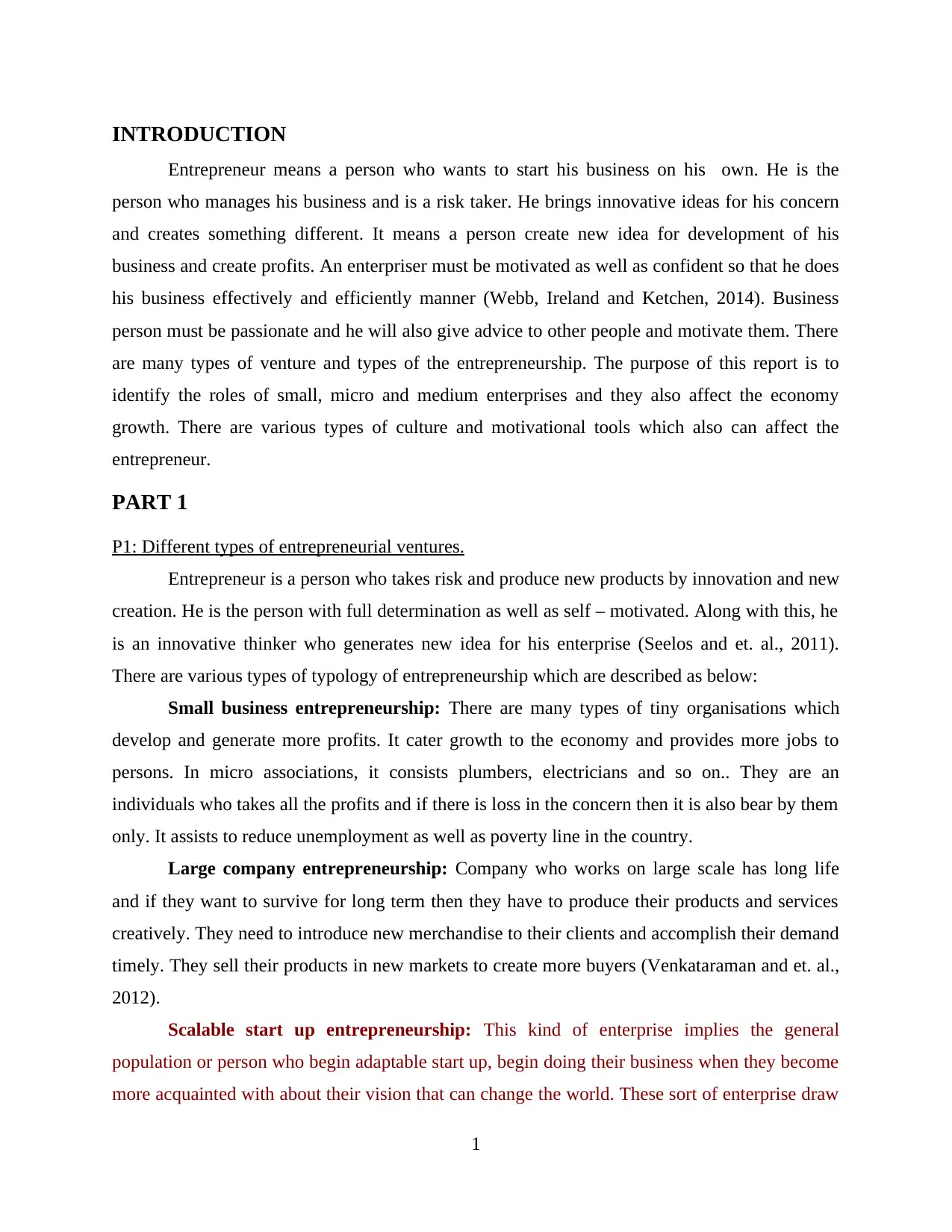
INTRODUCTION
Entrepreneur means a person who wants to start his business on his own. He is the
person who manages his business and is a risk taker. He brings innovative ideas for his concern
and creates something different. It means a person create new idea for development of his
business and create profits. An enterpriser must be motivated as well as confident so that he does
his business effectively and efficiently manner (Webb, Ireland and Ketchen, 2014). Business
person must be passionate and he will also give advice to other people and motivate them. There
are many types of venture and types of the entrepreneurship. The purpose of this report is to
identify the roles of small, micro and medium enterprises and they also affect the economy
growth. There are various types of culture and motivational tools which also can affect the
entrepreneur.
PART 1
P1: Different types of entrepreneurial ventures.
Entrepreneur is a person who takes risk and produce new products by innovation and new
creation. He is the person with full determination as well as self – motivated. Along with this, he
is an innovative thinker who generates new idea for his enterprise (Seelos and et. al., 2011).
There are various types of typology of entrepreneurship which are described as below:
Small business entrepreneurship: There are many types of tiny organisations which
develop and generate more profits. It cater growth to the economy and provides more jobs to
persons. In micro associations, it consists plumbers, electricians and so on.. They are an
individuals who takes all the profits and if there is loss in the concern then it is also bear by them
only. It assists to reduce unemployment as well as poverty line in the country.
Large company entrepreneurship: Company who works on large scale has long life
and if they want to survive for long term then they have to produce their products and services
creatively. They need to introduce new merchandise to their clients and accomplish their demand
timely. They sell their products in new markets to create more buyers (Venkataraman and et. al.,
2012).
Scalable start up entrepreneurship: This kind of enterprise implies the general
population or person who begin adaptable start up, begin doing their business when they become
more acquainted with about their vision that can change the world. These sort of enterprise draw
1
Entrepreneur means a person who wants to start his business on his own. He is the
person who manages his business and is a risk taker. He brings innovative ideas for his concern
and creates something different. It means a person create new idea for development of his
business and create profits. An enterpriser must be motivated as well as confident so that he does
his business effectively and efficiently manner (Webb, Ireland and Ketchen, 2014). Business
person must be passionate and he will also give advice to other people and motivate them. There
are many types of venture and types of the entrepreneurship. The purpose of this report is to
identify the roles of small, micro and medium enterprises and they also affect the economy
growth. There are various types of culture and motivational tools which also can affect the
entrepreneur.
PART 1
P1: Different types of entrepreneurial ventures.
Entrepreneur is a person who takes risk and produce new products by innovation and new
creation. He is the person with full determination as well as self – motivated. Along with this, he
is an innovative thinker who generates new idea for his enterprise (Seelos and et. al., 2011).
There are various types of typology of entrepreneurship which are described as below:
Small business entrepreneurship: There are many types of tiny organisations which
develop and generate more profits. It cater growth to the economy and provides more jobs to
persons. In micro associations, it consists plumbers, electricians and so on.. They are an
individuals who takes all the profits and if there is loss in the concern then it is also bear by them
only. It assists to reduce unemployment as well as poverty line in the country.
Large company entrepreneurship: Company who works on large scale has long life
and if they want to survive for long term then they have to produce their products and services
creatively. They need to introduce new merchandise to their clients and accomplish their demand
timely. They sell their products in new markets to create more buyers (Venkataraman and et. al.,
2012).
Scalable start up entrepreneurship: This kind of enterprise implies the general
population or person who begin adaptable start up, begin doing their business when they become
more acquainted with about their vision that can change the world. These sort of enterprise draw
1
⊘ This is a preview!⊘
Do you want full access?
Subscribe today to unlock all pages.

Trusted by 1+ million students worldwide
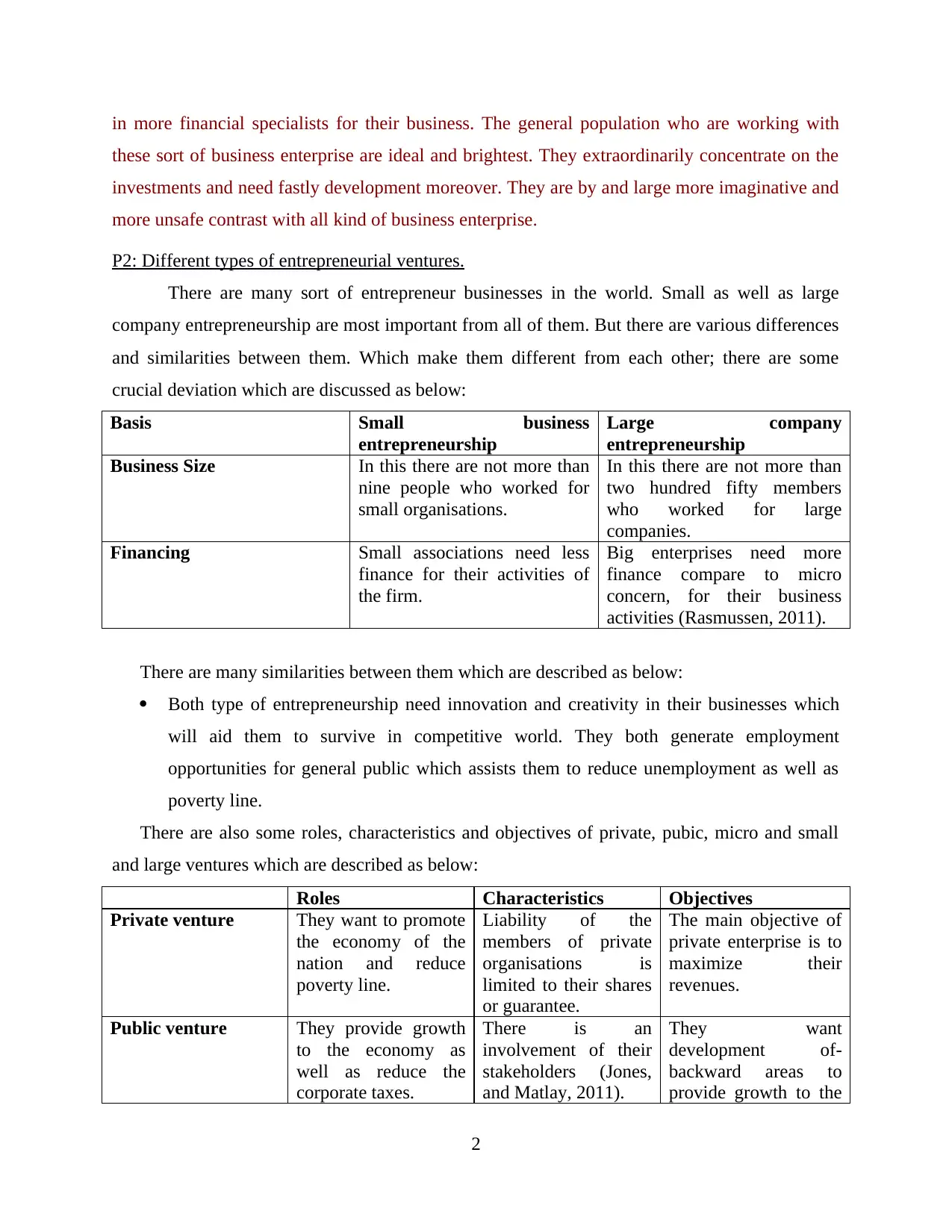
in more financial specialists for their business. The general population who are working with
these sort of business enterprise are ideal and brightest. They extraordinarily concentrate on the
investments and need fastly development moreover. They are by and large more imaginative and
more unsafe contrast with all kind of business enterprise.
P2: Different types of entrepreneurial ventures.
There are many sort of entrepreneur businesses in the world. Small as well as large
company entrepreneurship are most important from all of them. But there are various differences
and similarities between them. Which make them different from each other; there are some
crucial deviation which are discussed as below:
Basis Small business
entrepreneurship
Large company
entrepreneurship
Business Size In this there are not more than
nine people who worked for
small organisations.
In this there are not more than
two hundred fifty members
who worked for large
companies.
Financing Small associations need less
finance for their activities of
the firm.
Big enterprises need more
finance compare to micro
concern, for their business
activities (Rasmussen, 2011).
There are many similarities between them which are described as below:
Both type of entrepreneurship need innovation and creativity in their businesses which
will aid them to survive in competitive world. They both generate employment
opportunities for general public which assists them to reduce unemployment as well as
poverty line.
There are also some roles, characteristics and objectives of private, pubic, micro and small
and large ventures which are described as below:
Roles Characteristics Objectives
Private venture They want to promote
the economy of the
nation and reduce
poverty line.
Liability of the
members of private
organisations is
limited to their shares
or guarantee.
The main objective of
private enterprise is to
maximize their
revenues.
Public venture They provide growth
to the economy as
well as reduce the
corporate taxes.
There is an
involvement of their
stakeholders (Jones,
and Matlay, 2011).
They want
development of-
backward areas to
provide growth to the
2
these sort of business enterprise are ideal and brightest. They extraordinarily concentrate on the
investments and need fastly development moreover. They are by and large more imaginative and
more unsafe contrast with all kind of business enterprise.
P2: Different types of entrepreneurial ventures.
There are many sort of entrepreneur businesses in the world. Small as well as large
company entrepreneurship are most important from all of them. But there are various differences
and similarities between them. Which make them different from each other; there are some
crucial deviation which are discussed as below:
Basis Small business
entrepreneurship
Large company
entrepreneurship
Business Size In this there are not more than
nine people who worked for
small organisations.
In this there are not more than
two hundred fifty members
who worked for large
companies.
Financing Small associations need less
finance for their activities of
the firm.
Big enterprises need more
finance compare to micro
concern, for their business
activities (Rasmussen, 2011).
There are many similarities between them which are described as below:
Both type of entrepreneurship need innovation and creativity in their businesses which
will aid them to survive in competitive world. They both generate employment
opportunities for general public which assists them to reduce unemployment as well as
poverty line.
There are also some roles, characteristics and objectives of private, pubic, micro and small
and large ventures which are described as below:
Roles Characteristics Objectives
Private venture They want to promote
the economy of the
nation and reduce
poverty line.
Liability of the
members of private
organisations is
limited to their shares
or guarantee.
The main objective of
private enterprise is to
maximize their
revenues.
Public venture They provide growth
to the economy as
well as reduce the
corporate taxes.
There is an
involvement of their
stakeholders (Jones,
and Matlay, 2011).
They want
development of-
backward areas to
provide growth to the
2
Paraphrase This Document
Need a fresh take? Get an instant paraphrase of this document with our AI Paraphraser
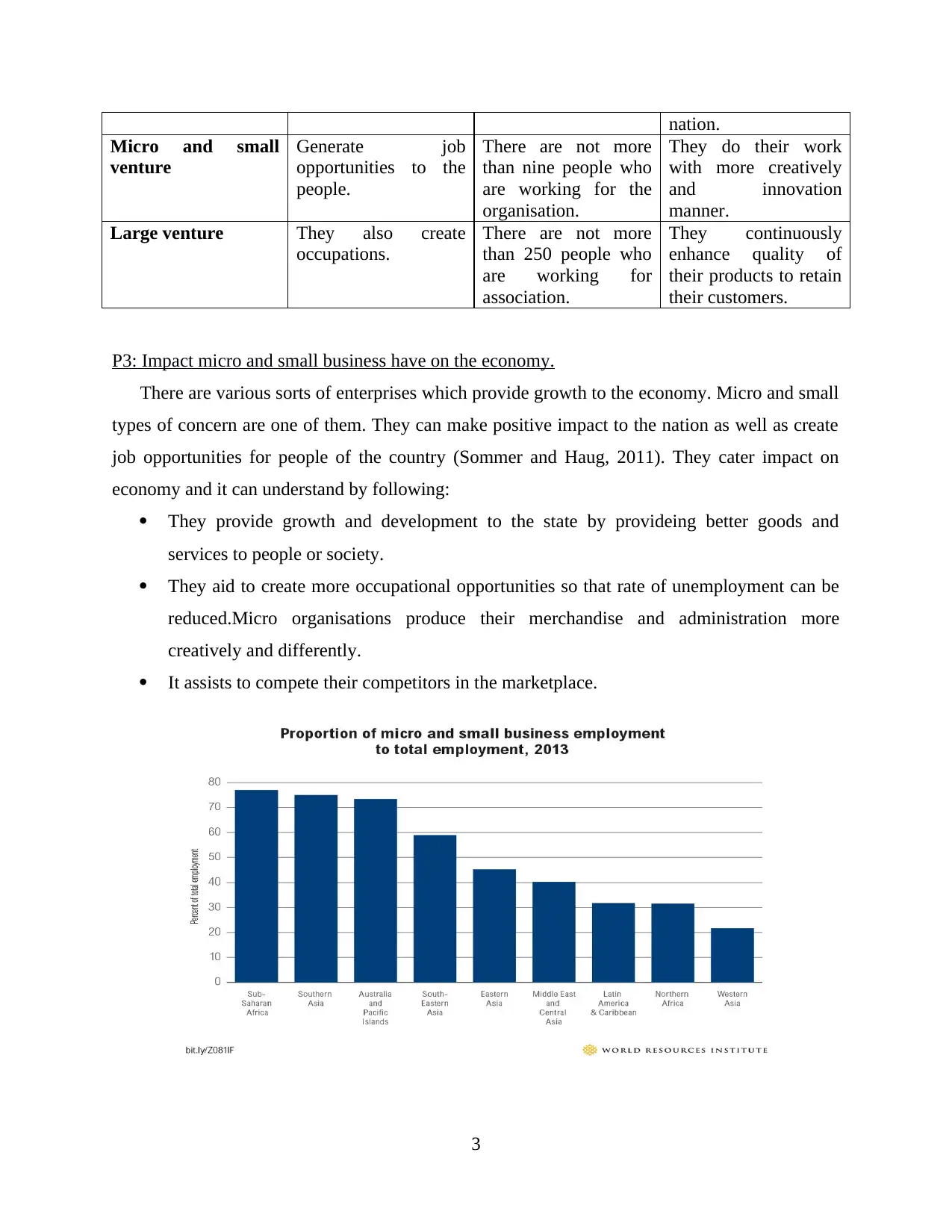
nation.
Micro and small
venture
Generate job
opportunities to the
people.
There are not more
than nine people who
are working for the
organisation.
They do their work
with more creatively
and innovation
manner.
Large venture They also create
occupations.
There are not more
than 250 people who
are working for
association.
They continuously
enhance quality of
their products to retain
their customers.
P3: Impact micro and small business have on the economy.
There are various sorts of enterprises which provide growth to the economy. Micro and small
types of concern are one of them. They can make positive impact to the nation as well as create
job opportunities for people of the country (Sommer and Haug, 2011). They cater impact on
economy and it can understand by following:
They provide growth and development to the state by provideing better goods and
services to people or society.
They aid to create more occupational opportunities so that rate of unemployment can be
reduced.Micro organisations produce their merchandise and administration more
creatively and differently.
It assists to compete their competitors in the marketplace.
3
Micro and small
venture
Generate job
opportunities to the
people.
There are not more
than nine people who
are working for the
organisation.
They do their work
with more creatively
and innovation
manner.
Large venture They also create
occupations.
There are not more
than 250 people who
are working for
association.
They continuously
enhance quality of
their products to retain
their customers.
P3: Impact micro and small business have on the economy.
There are various sorts of enterprises which provide growth to the economy. Micro and small
types of concern are one of them. They can make positive impact to the nation as well as create
job opportunities for people of the country (Sommer and Haug, 2011). They cater impact on
economy and it can understand by following:
They provide growth and development to the state by provideing better goods and
services to people or society.
They aid to create more occupational opportunities so that rate of unemployment can be
reduced.Micro organisations produce their merchandise and administration more
creatively and differently.
It assists to compete their competitors in the marketplace.
3
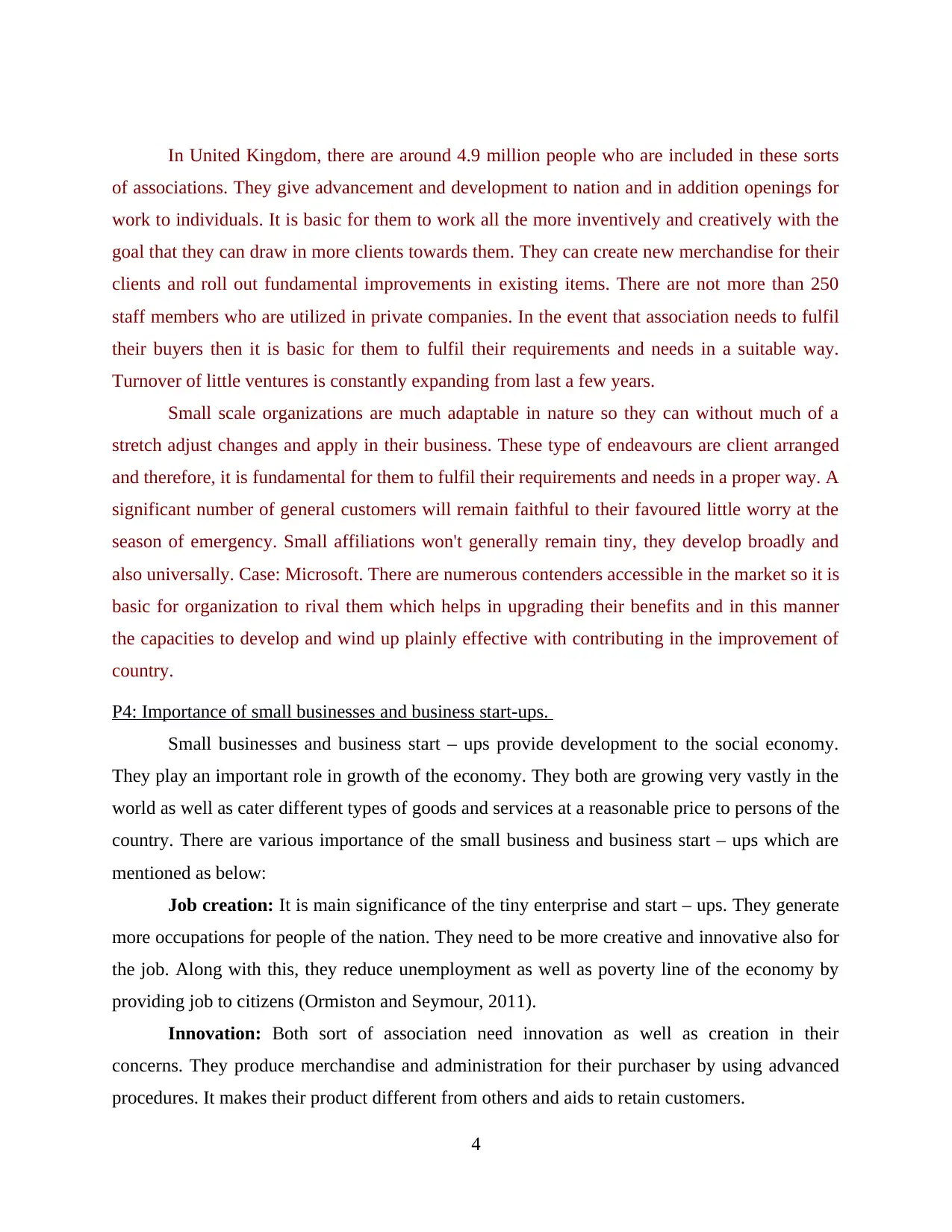
In United Kingdom, there are around 4.9 million people who are included in these sorts
of associations. They give advancement and development to nation and in addition openings for
work to individuals. It is basic for them to work all the more inventively and creatively with the
goal that they can draw in more clients towards them. They can create new merchandise for their
clients and roll out fundamental improvements in existing items. There are not more than 250
staff members who are utilized in private companies. In the event that association needs to fulfil
their buyers then it is basic for them to fulfil their requirements and needs in a suitable way.
Turnover of little ventures is constantly expanding from last a few years.
Small scale organizations are much adaptable in nature so they can without much of a
stretch adjust changes and apply in their business. These type of endeavours are client arranged
and therefore, it is fundamental for them to fulfil their requirements and needs in a proper way. A
significant number of general customers will remain faithful to their favoured little worry at the
season of emergency. Small affiliations won't generally remain tiny, they develop broadly and
also universally. Case: Microsoft. There are numerous contenders accessible in the market so it is
basic for organization to rival them which helps in upgrading their benefits and in this manner
the capacities to develop and wind up plainly effective with contributing in the improvement of
country.
P4: Importance of small businesses and business start-ups.
Small businesses and business start – ups provide development to the social economy.
They play an important role in growth of the economy. They both are growing very vastly in the
world as well as cater different types of goods and services at a reasonable price to persons of the
country. There are various importance of the small business and business start – ups which are
mentioned as below:
Job creation: It is main significance of the tiny enterprise and start – ups. They generate
more occupations for people of the nation. They need to be more creative and innovative also for
the job. Along with this, they reduce unemployment as well as poverty line of the economy by
providing job to citizens (Ormiston and Seymour, 2011).
Innovation: Both sort of association need innovation as well as creation in their
concerns. They produce merchandise and administration for their purchaser by using advanced
procedures. It makes their product different from others and aids to retain customers.
4
of associations. They give advancement and development to nation and in addition openings for
work to individuals. It is basic for them to work all the more inventively and creatively with the
goal that they can draw in more clients towards them. They can create new merchandise for their
clients and roll out fundamental improvements in existing items. There are not more than 250
staff members who are utilized in private companies. In the event that association needs to fulfil
their buyers then it is basic for them to fulfil their requirements and needs in a suitable way.
Turnover of little ventures is constantly expanding from last a few years.
Small scale organizations are much adaptable in nature so they can without much of a
stretch adjust changes and apply in their business. These type of endeavours are client arranged
and therefore, it is fundamental for them to fulfil their requirements and needs in a proper way. A
significant number of general customers will remain faithful to their favoured little worry at the
season of emergency. Small affiliations won't generally remain tiny, they develop broadly and
also universally. Case: Microsoft. There are numerous contenders accessible in the market so it is
basic for organization to rival them which helps in upgrading their benefits and in this manner
the capacities to develop and wind up plainly effective with contributing in the improvement of
country.
P4: Importance of small businesses and business start-ups.
Small businesses and business start – ups provide development to the social economy.
They play an important role in growth of the economy. They both are growing very vastly in the
world as well as cater different types of goods and services at a reasonable price to persons of the
country. There are various importance of the small business and business start – ups which are
mentioned as below:
Job creation: It is main significance of the tiny enterprise and start – ups. They generate
more occupations for people of the nation. They need to be more creative and innovative also for
the job. Along with this, they reduce unemployment as well as poverty line of the economy by
providing job to citizens (Ormiston and Seymour, 2011).
Innovation: Both sort of association need innovation as well as creation in their
concerns. They produce merchandise and administration for their purchaser by using advanced
procedures. It makes their product different from others and aids to retain customers.
4
⊘ This is a preview!⊘
Do you want full access?
Subscribe today to unlock all pages.

Trusted by 1+ million students worldwide
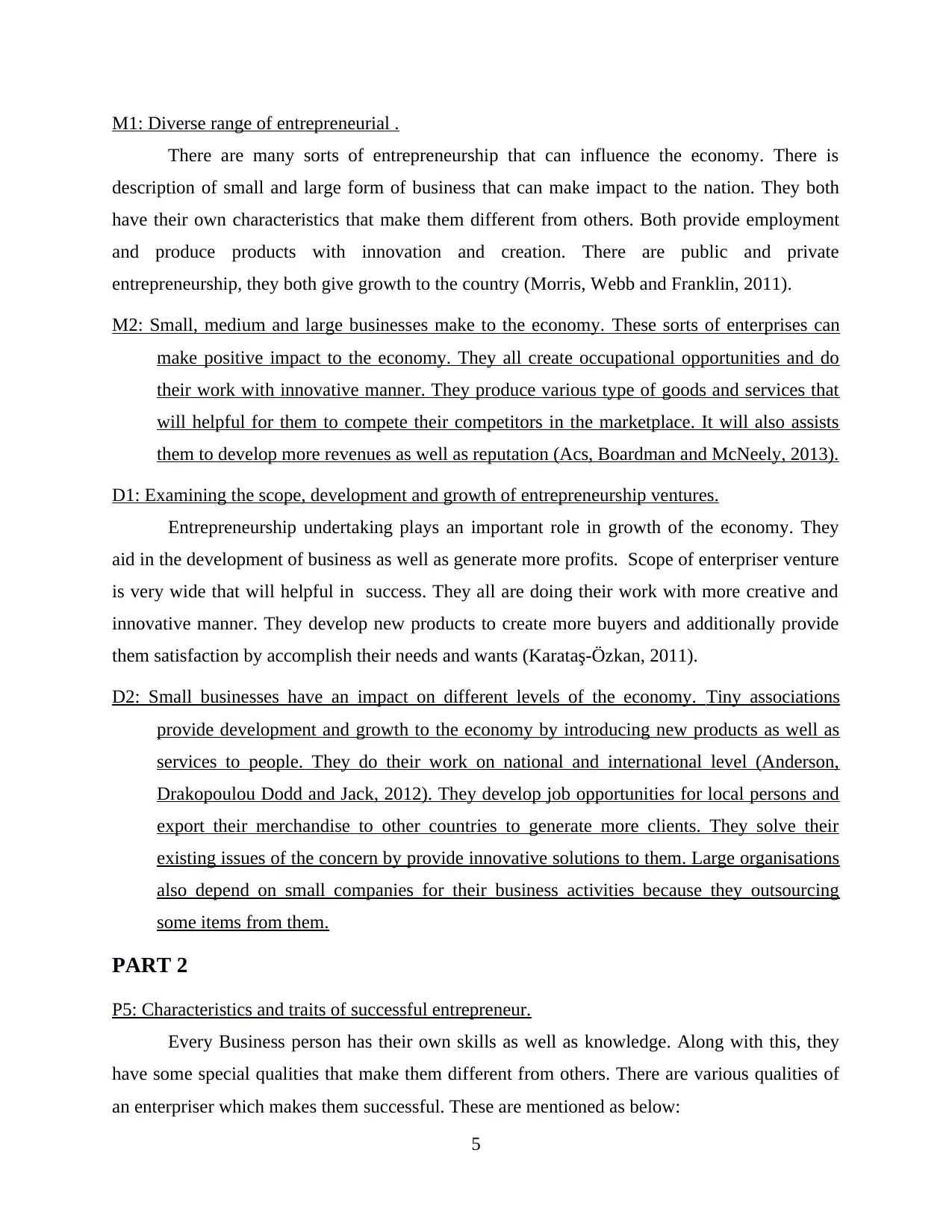
M1: Diverse range of entrepreneurial .
There are many sorts of entrepreneurship that can influence the economy. There is
description of small and large form of business that can make impact to the nation. They both
have their own characteristics that make them different from others. Both provide employment
and produce products with innovation and creation. There are public and private
entrepreneurship, they both give growth to the country (Morris, Webb and Franklin, 2011).
M2: Small, medium and large businesses make to the economy. These sorts of enterprises can
make positive impact to the economy. They all create occupational opportunities and do
their work with innovative manner. They produce various type of goods and services that
will helpful for them to compete their competitors in the marketplace. It will also assists
them to develop more revenues as well as reputation (Acs, Boardman and McNeely, 2013).
D1: Examining the scope, development and growth of entrepreneurship ventures.
Entrepreneurship undertaking plays an important role in growth of the economy. They
aid in the development of business as well as generate more profits. Scope of enterpriser venture
is very wide that will helpful in success. They all are doing their work with more creative and
innovative manner. They develop new products to create more buyers and additionally provide
them satisfaction by accomplish their needs and wants (Karataş-Özkan, 2011).
D2: Small businesses have an impact on different levels of the economy. Tiny associations
provide development and growth to the economy by introducing new products as well as
services to people. They do their work on national and international level (Anderson,
Drakopoulou Dodd and Jack, 2012). They develop job opportunities for local persons and
export their merchandise to other countries to generate more clients. They solve their
existing issues of the concern by provide innovative solutions to them. Large organisations
also depend on small companies for their business activities because they outsourcing
some items from them.
PART 2
P5: Characteristics and traits of successful entrepreneur.
Every Business person has their own skills as well as knowledge. Along with this, they
have some special qualities that make them different from others. There are various qualities of
an enterpriser which makes them successful. These are mentioned as below:
5
There are many sorts of entrepreneurship that can influence the economy. There is
description of small and large form of business that can make impact to the nation. They both
have their own characteristics that make them different from others. Both provide employment
and produce products with innovation and creation. There are public and private
entrepreneurship, they both give growth to the country (Morris, Webb and Franklin, 2011).
M2: Small, medium and large businesses make to the economy. These sorts of enterprises can
make positive impact to the economy. They all create occupational opportunities and do
their work with innovative manner. They produce various type of goods and services that
will helpful for them to compete their competitors in the marketplace. It will also assists
them to develop more revenues as well as reputation (Acs, Boardman and McNeely, 2013).
D1: Examining the scope, development and growth of entrepreneurship ventures.
Entrepreneurship undertaking plays an important role in growth of the economy. They
aid in the development of business as well as generate more profits. Scope of enterpriser venture
is very wide that will helpful in success. They all are doing their work with more creative and
innovative manner. They develop new products to create more buyers and additionally provide
them satisfaction by accomplish their needs and wants (Karataş-Özkan, 2011).
D2: Small businesses have an impact on different levels of the economy. Tiny associations
provide development and growth to the economy by introducing new products as well as
services to people. They do their work on national and international level (Anderson,
Drakopoulou Dodd and Jack, 2012). They develop job opportunities for local persons and
export their merchandise to other countries to generate more clients. They solve their
existing issues of the concern by provide innovative solutions to them. Large organisations
also depend on small companies for their business activities because they outsourcing
some items from them.
PART 2
P5: Characteristics and traits of successful entrepreneur.
Every Business person has their own skills as well as knowledge. Along with this, they
have some special qualities that make them different from others. There are various qualities of
an enterpriser which makes them successful. These are mentioned as below:
5
Paraphrase This Document
Need a fresh take? Get an instant paraphrase of this document with our AI Paraphraser
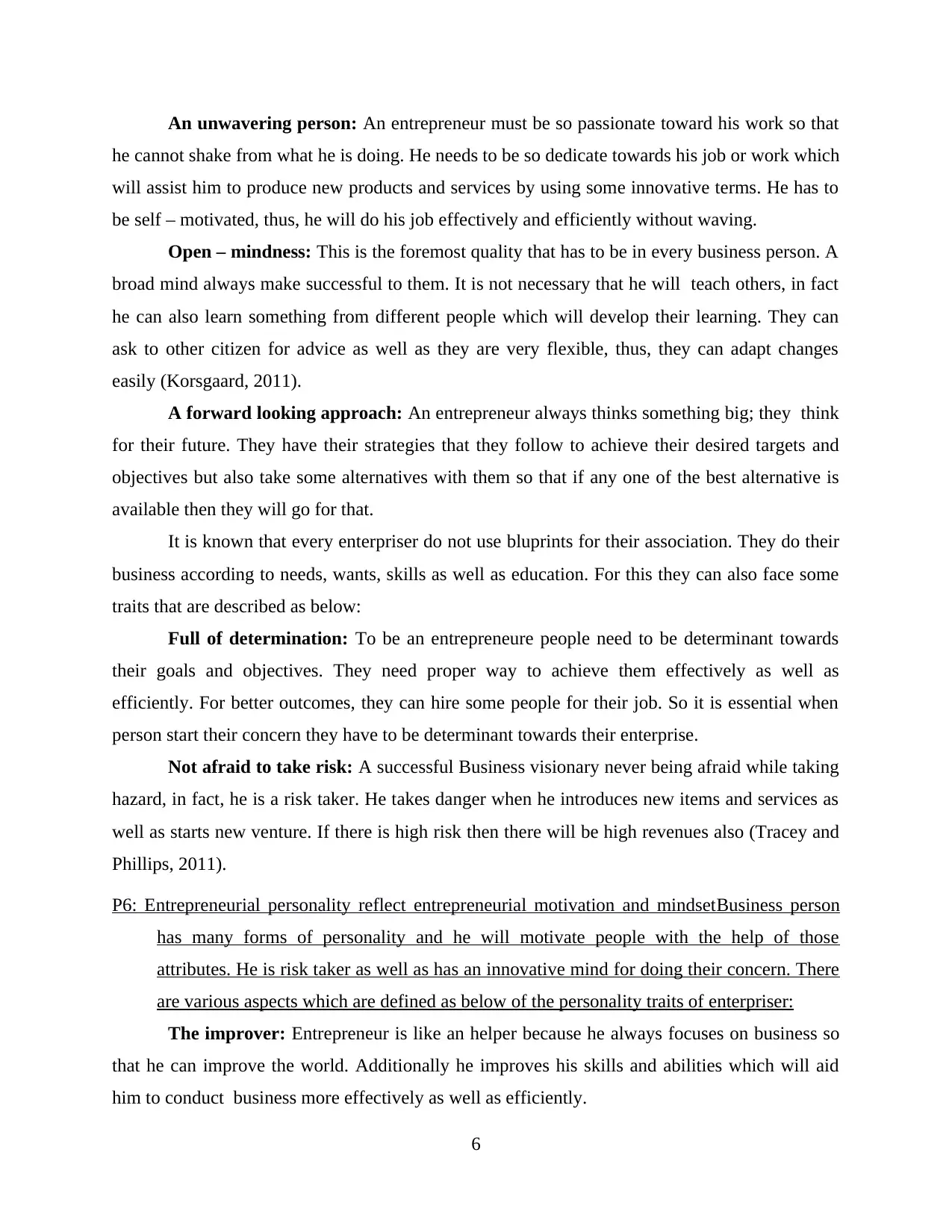
An unwavering person: An entrepreneur must be so passionate toward his work so that
he cannot shake from what he is doing. He needs to be so dedicate towards his job or work which
will assist him to produce new products and services by using some innovative terms. He has to
be self – motivated, thus, he will do his job effectively and efficiently without waving.
Open – mindness: This is the foremost quality that has to be in every business person. A
broad mind always make successful to them. It is not necessary that he will teach others, in fact
he can also learn something from different people which will develop their learning. They can
ask to other citizen for advice as well as they are very flexible, thus, they can adapt changes
easily (Korsgaard, 2011).
A forward looking approach: An entrepreneur always thinks something big; they think
for their future. They have their strategies that they follow to achieve their desired targets and
objectives but also take some alternatives with them so that if any one of the best alternative is
available then they will go for that.
It is known that every enterpriser do not use bluprints for their association. They do their
business according to needs, wants, skills as well as education. For this they can also face some
traits that are described as below:
Full of determination: To be an entrepreneure people need to be determinant towards
their goals and objectives. They need proper way to achieve them effectively as well as
efficiently. For better outcomes, they can hire some people for their job. So it is essential when
person start their concern they have to be determinant towards their enterprise.
Not afraid to take risk: A successful Business visionary never being afraid while taking
hazard, in fact, he is a risk taker. He takes danger when he introduces new items and services as
well as starts new venture. If there is high risk then there will be high revenues also (Tracey and
Phillips, 2011).
P6: Entrepreneurial personality reflect entrepreneurial motivation and mindsetBusiness person
has many forms of personality and he will motivate people with the help of those
attributes. He is risk taker as well as has an innovative mind for doing their concern. There
are various aspects which are defined as below of the personality traits of enterpriser:
The improver: Entrepreneur is like an helper because he always focuses on business so
that he can improve the world. Additionally he improves his skills and abilities which will aid
him to conduct business more effectively as well as efficiently.
6
he cannot shake from what he is doing. He needs to be so dedicate towards his job or work which
will assist him to produce new products and services by using some innovative terms. He has to
be self – motivated, thus, he will do his job effectively and efficiently without waving.
Open – mindness: This is the foremost quality that has to be in every business person. A
broad mind always make successful to them. It is not necessary that he will teach others, in fact
he can also learn something from different people which will develop their learning. They can
ask to other citizen for advice as well as they are very flexible, thus, they can adapt changes
easily (Korsgaard, 2011).
A forward looking approach: An entrepreneur always thinks something big; they think
for their future. They have their strategies that they follow to achieve their desired targets and
objectives but also take some alternatives with them so that if any one of the best alternative is
available then they will go for that.
It is known that every enterpriser do not use bluprints for their association. They do their
business according to needs, wants, skills as well as education. For this they can also face some
traits that are described as below:
Full of determination: To be an entrepreneure people need to be determinant towards
their goals and objectives. They need proper way to achieve them effectively as well as
efficiently. For better outcomes, they can hire some people for their job. So it is essential when
person start their concern they have to be determinant towards their enterprise.
Not afraid to take risk: A successful Business visionary never being afraid while taking
hazard, in fact, he is a risk taker. He takes danger when he introduces new items and services as
well as starts new venture. If there is high risk then there will be high revenues also (Tracey and
Phillips, 2011).
P6: Entrepreneurial personality reflect entrepreneurial motivation and mindsetBusiness person
has many forms of personality and he will motivate people with the help of those
attributes. He is risk taker as well as has an innovative mind for doing their concern. There
are various aspects which are defined as below of the personality traits of enterpriser:
The improver: Entrepreneur is like an helper because he always focuses on business so
that he can improve the world. Additionally he improves his skills and abilities which will aid
him to conduct business more effectively as well as efficiently.
6
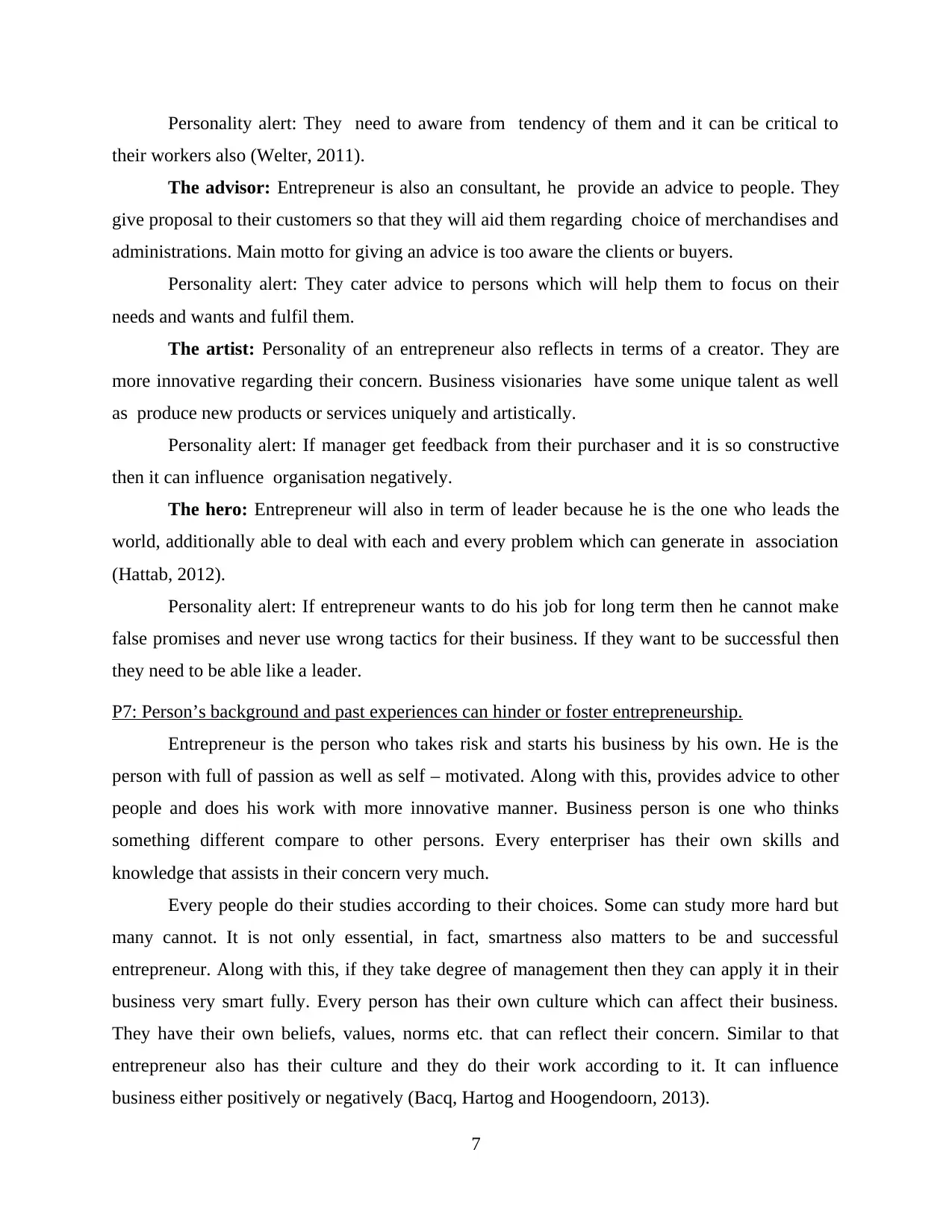
Personality alert: They need to aware from tendency of them and it can be critical to
their workers also (Welter, 2011).
The advisor: Entrepreneur is also an consultant, he provide an advice to people. They
give proposal to their customers so that they will aid them regarding choice of merchandises and
administrations. Main motto for giving an advice is too aware the clients or buyers.
Personality alert: They cater advice to persons which will help them to focus on their
needs and wants and fulfil them.
The artist: Personality of an entrepreneur also reflects in terms of a creator. They are
more innovative regarding their concern. Business visionaries have some unique talent as well
as produce new products or services uniquely and artistically.
Personality alert: If manager get feedback from their purchaser and it is so constructive
then it can influence organisation negatively.
The hero: Entrepreneur will also in term of leader because he is the one who leads the
world, additionally able to deal with each and every problem which can generate in association
(Hattab, 2012).
Personality alert: If entrepreneur wants to do his job for long term then he cannot make
false promises and never use wrong tactics for their business. If they want to be successful then
they need to be able like a leader.
P7: Person’s background and past experiences can hinder or foster entrepreneurship.
Entrepreneur is the person who takes risk and starts his business by his own. He is the
person with full of passion as well as self – motivated. Along with this, provides advice to other
people and does his work with more innovative manner. Business person is one who thinks
something different compare to other persons. Every enterpriser has their own skills and
knowledge that assists in their concern very much.
Every people do their studies according to their choices. Some can study more hard but
many cannot. It is not only essential, in fact, smartness also matters to be and successful
entrepreneur. Along with this, if they take degree of management then they can apply it in their
business very smart fully. Every person has their own culture which can affect their business.
They have their own beliefs, values, norms etc. that can reflect their concern. Similar to that
entrepreneur also has their culture and they do their work according to it. It can influence
business either positively or negatively (Bacq, Hartog and Hoogendoorn, 2013).
7
their workers also (Welter, 2011).
The advisor: Entrepreneur is also an consultant, he provide an advice to people. They
give proposal to their customers so that they will aid them regarding choice of merchandises and
administrations. Main motto for giving an advice is too aware the clients or buyers.
Personality alert: They cater advice to persons which will help them to focus on their
needs and wants and fulfil them.
The artist: Personality of an entrepreneur also reflects in terms of a creator. They are
more innovative regarding their concern. Business visionaries have some unique talent as well
as produce new products or services uniquely and artistically.
Personality alert: If manager get feedback from their purchaser and it is so constructive
then it can influence organisation negatively.
The hero: Entrepreneur will also in term of leader because he is the one who leads the
world, additionally able to deal with each and every problem which can generate in association
(Hattab, 2012).
Personality alert: If entrepreneur wants to do his job for long term then he cannot make
false promises and never use wrong tactics for their business. If they want to be successful then
they need to be able like a leader.
P7: Person’s background and past experiences can hinder or foster entrepreneurship.
Entrepreneur is the person who takes risk and starts his business by his own. He is the
person with full of passion as well as self – motivated. Along with this, provides advice to other
people and does his work with more innovative manner. Business person is one who thinks
something different compare to other persons. Every enterpriser has their own skills and
knowledge that assists in their concern very much.
Every people do their studies according to their choices. Some can study more hard but
many cannot. It is not only essential, in fact, smartness also matters to be and successful
entrepreneur. Along with this, if they take degree of management then they can apply it in their
business very smart fully. Every person has their own culture which can affect their business.
They have their own beliefs, values, norms etc. that can reflect their concern. Similar to that
entrepreneur also has their culture and they do their work according to it. It can influence
business either positively or negatively (Bacq, Hartog and Hoogendoorn, 2013).
7
⊘ This is a preview!⊘
Do you want full access?
Subscribe today to unlock all pages.

Trusted by 1+ million students worldwide
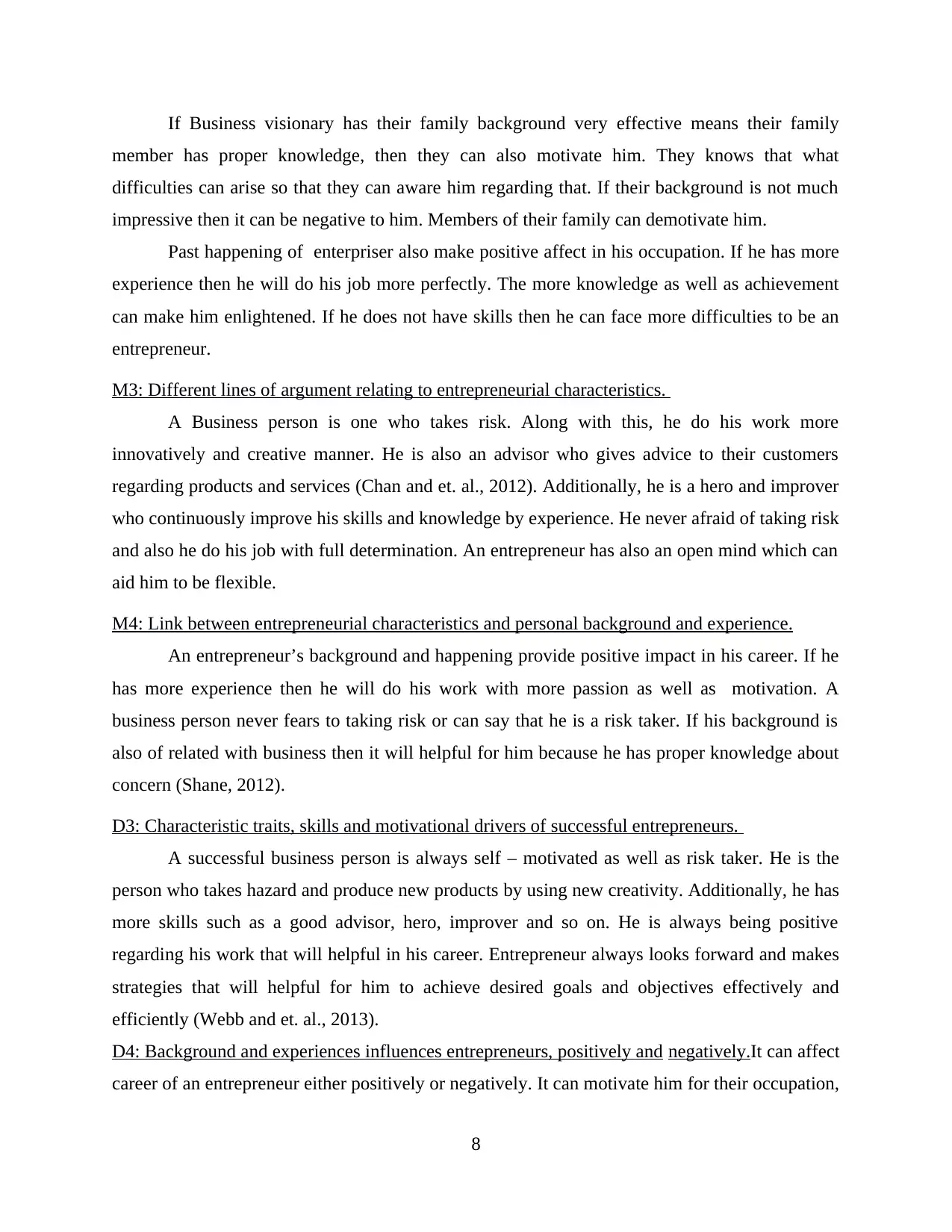
If Business visionary has their family background very effective means their family
member has proper knowledge, then they can also motivate him. They knows that what
difficulties can arise so that they can aware him regarding that. If their background is not much
impressive then it can be negative to him. Members of their family can demotivate him.
Past happening of enterpriser also make positive affect in his occupation. If he has more
experience then he will do his job more perfectly. The more knowledge as well as achievement
can make him enlightened. If he does not have skills then he can face more difficulties to be an
entrepreneur.
M3: Different lines of argument relating to entrepreneurial characteristics.
A Business person is one who takes risk. Along with this, he do his work more
innovatively and creative manner. He is also an advisor who gives advice to their customers
regarding products and services (Chan and et. al., 2012). Additionally, he is a hero and improver
who continuously improve his skills and knowledge by experience. He never afraid of taking risk
and also he do his job with full determination. An entrepreneur has also an open mind which can
aid him to be flexible.
M4: Link between entrepreneurial characteristics and personal background and experience.
An entrepreneur’s background and happening provide positive impact in his career. If he
has more experience then he will do his work with more passion as well as motivation. A
business person never fears to taking risk or can say that he is a risk taker. If his background is
also of related with business then it will helpful for him because he has proper knowledge about
concern (Shane, 2012).
D3: Characteristic traits, skills and motivational drivers of successful entrepreneurs.
A successful business person is always self – motivated as well as risk taker. He is the
person who takes hazard and produce new products by using new creativity. Additionally, he has
more skills such as a good advisor, hero, improver and so on. He is always being positive
regarding his work that will helpful in his career. Entrepreneur always looks forward and makes
strategies that will helpful for him to achieve desired goals and objectives effectively and
efficiently (Webb and et. al., 2013).
D4: Background and experiences influences entrepreneurs, positively and negatively.It can affect
career of an entrepreneur either positively or negatively. It can motivate him for their occupation,
8
member has proper knowledge, then they can also motivate him. They knows that what
difficulties can arise so that they can aware him regarding that. If their background is not much
impressive then it can be negative to him. Members of their family can demotivate him.
Past happening of enterpriser also make positive affect in his occupation. If he has more
experience then he will do his job more perfectly. The more knowledge as well as achievement
can make him enlightened. If he does not have skills then he can face more difficulties to be an
entrepreneur.
M3: Different lines of argument relating to entrepreneurial characteristics.
A Business person is one who takes risk. Along with this, he do his work more
innovatively and creative manner. He is also an advisor who gives advice to their customers
regarding products and services (Chan and et. al., 2012). Additionally, he is a hero and improver
who continuously improve his skills and knowledge by experience. He never afraid of taking risk
and also he do his job with full determination. An entrepreneur has also an open mind which can
aid him to be flexible.
M4: Link between entrepreneurial characteristics and personal background and experience.
An entrepreneur’s background and happening provide positive impact in his career. If he
has more experience then he will do his work with more passion as well as motivation. A
business person never fears to taking risk or can say that he is a risk taker. If his background is
also of related with business then it will helpful for him because he has proper knowledge about
concern (Shane, 2012).
D3: Characteristic traits, skills and motivational drivers of successful entrepreneurs.
A successful business person is always self – motivated as well as risk taker. He is the
person who takes hazard and produce new products by using new creativity. Additionally, he has
more skills such as a good advisor, hero, improver and so on. He is always being positive
regarding his work that will helpful in his career. Entrepreneur always looks forward and makes
strategies that will helpful for him to achieve desired goals and objectives effectively and
efficiently (Webb and et. al., 2013).
D4: Background and experiences influences entrepreneurs, positively and negatively.It can affect
career of an entrepreneur either positively or negatively. It can motivate him for their occupation,
8
Paraphrase This Document
Need a fresh take? Get an instant paraphrase of this document with our AI Paraphraser
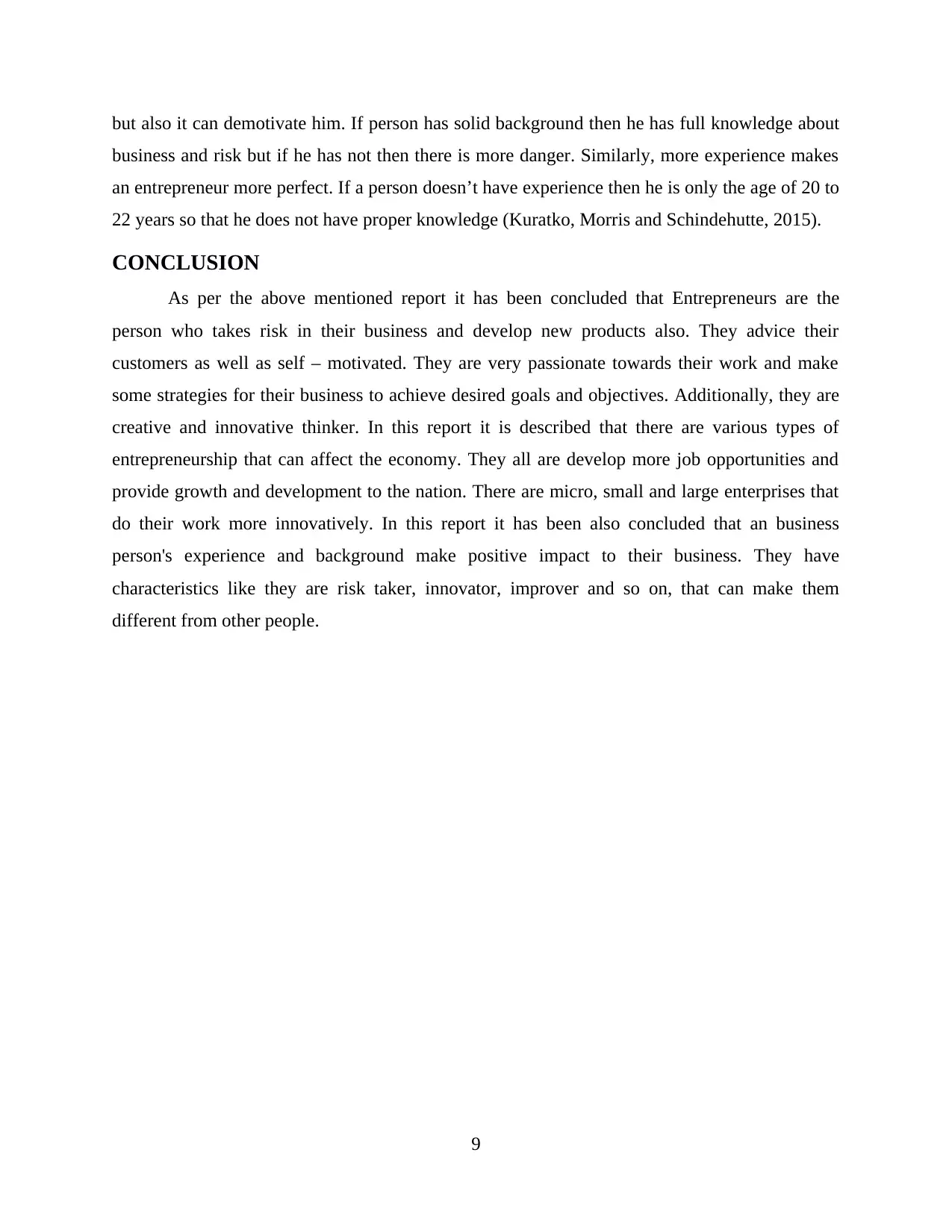
but also it can demotivate him. If person has solid background then he has full knowledge about
business and risk but if he has not then there is more danger. Similarly, more experience makes
an entrepreneur more perfect. If a person doesn’t have experience then he is only the age of 20 to
22 years so that he does not have proper knowledge (Kuratko, Morris and Schindehutte, 2015).
CONCLUSION
As per the above mentioned report it has been concluded that Entrepreneurs are the
person who takes risk in their business and develop new products also. They advice their
customers as well as self – motivated. They are very passionate towards their work and make
some strategies for their business to achieve desired goals and objectives. Additionally, they are
creative and innovative thinker. In this report it is described that there are various types of
entrepreneurship that can affect the economy. They all are develop more job opportunities and
provide growth and development to the nation. There are micro, small and large enterprises that
do their work more innovatively. In this report it has been also concluded that an business
person's experience and background make positive impact to their business. They have
characteristics like they are risk taker, innovator, improver and so on, that can make them
different from other people.
9
business and risk but if he has not then there is more danger. Similarly, more experience makes
an entrepreneur more perfect. If a person doesn’t have experience then he is only the age of 20 to
22 years so that he does not have proper knowledge (Kuratko, Morris and Schindehutte, 2015).
CONCLUSION
As per the above mentioned report it has been concluded that Entrepreneurs are the
person who takes risk in their business and develop new products also. They advice their
customers as well as self – motivated. They are very passionate towards their work and make
some strategies for their business to achieve desired goals and objectives. Additionally, they are
creative and innovative thinker. In this report it is described that there are various types of
entrepreneurship that can affect the economy. They all are develop more job opportunities and
provide growth and development to the nation. There are micro, small and large enterprises that
do their work more innovatively. In this report it has been also concluded that an business
person's experience and background make positive impact to their business. They have
characteristics like they are risk taker, innovator, improver and so on, that can make them
different from other people.
9
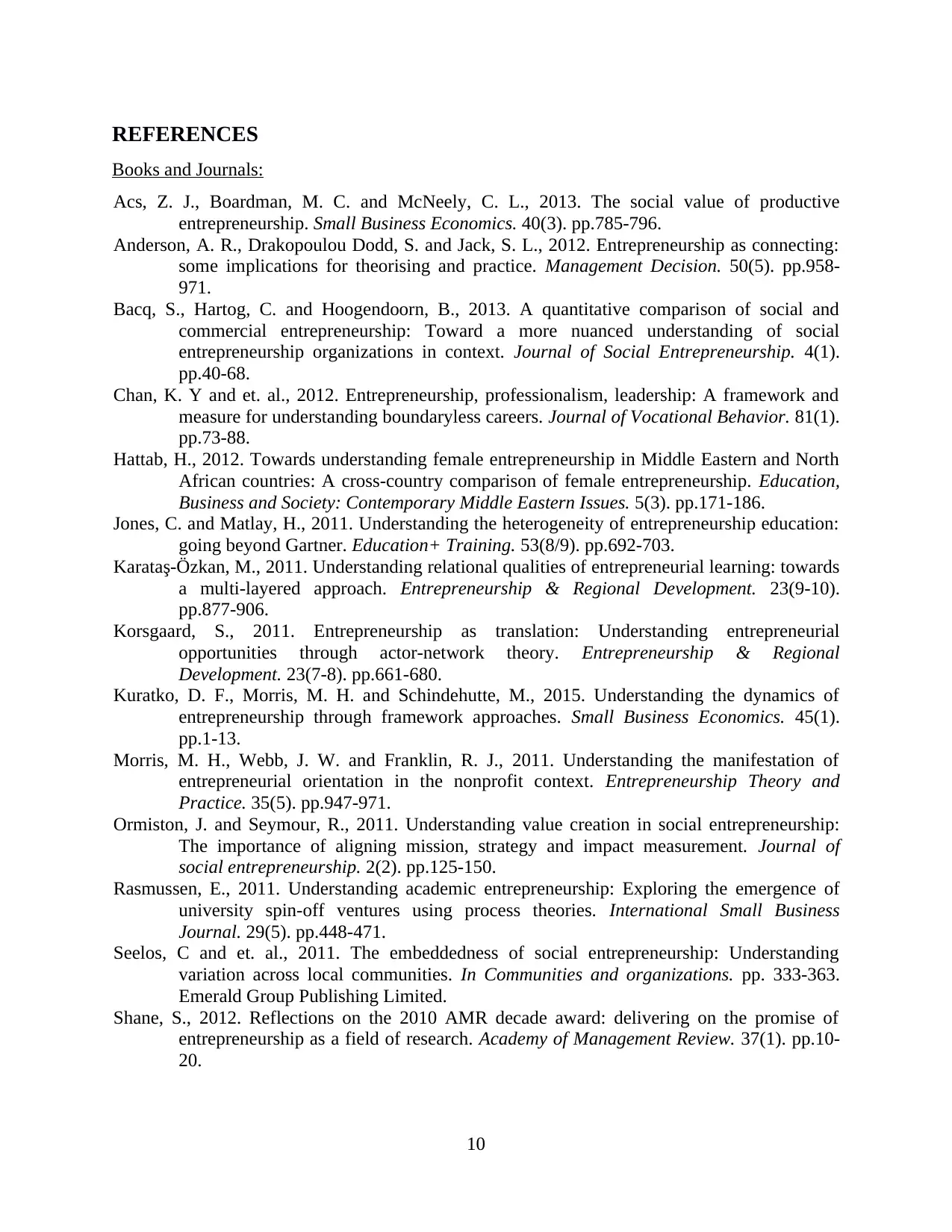
REFERENCES
Books and Journals:
Acs, Z. J., Boardman, M. C. and McNeely, C. L., 2013. The social value of productive
entrepreneurship. Small Business Economics. 40(3). pp.785-796.
Anderson, A. R., Drakopoulou Dodd, S. and Jack, S. L., 2012. Entrepreneurship as connecting:
some implications for theorising and practice. Management Decision. 50(5). pp.958-
971.
Bacq, S., Hartog, C. and Hoogendoorn, B., 2013. A quantitative comparison of social and
commercial entrepreneurship: Toward a more nuanced understanding of social
entrepreneurship organizations in context. Journal of Social Entrepreneurship. 4(1).
pp.40-68.
Chan, K. Y and et. al., 2012. Entrepreneurship, professionalism, leadership: A framework and
measure for understanding boundaryless careers. Journal of Vocational Behavior. 81(1).
pp.73-88.
Hattab, H., 2012. Towards understanding female entrepreneurship in Middle Eastern and North
African countries: A cross-country comparison of female entrepreneurship. Education,
Business and Society: Contemporary Middle Eastern Issues. 5(3). pp.171-186.
Jones, C. and Matlay, H., 2011. Understanding the heterogeneity of entrepreneurship education:
going beyond Gartner. Education+ Training. 53(8/9). pp.692-703.
Karataş-Özkan, M., 2011. Understanding relational qualities of entrepreneurial learning: towards
a multi-layered approach. Entrepreneurship & Regional Development. 23(9-10).
pp.877-906.
Korsgaard, S., 2011. Entrepreneurship as translation: Understanding entrepreneurial
opportunities through actor-network theory. Entrepreneurship & Regional
Development. 23(7-8). pp.661-680.
Kuratko, D. F., Morris, M. H. and Schindehutte, M., 2015. Understanding the dynamics of
entrepreneurship through framework approaches. Small Business Economics. 45(1).
pp.1-13.
Morris, M. H., Webb, J. W. and Franklin, R. J., 2011. Understanding the manifestation of
entrepreneurial orientation in the nonprofit context. Entrepreneurship Theory and
Practice. 35(5). pp.947-971.
Ormiston, J. and Seymour, R., 2011. Understanding value creation in social entrepreneurship:
The importance of aligning mission, strategy and impact measurement. Journal of
social entrepreneurship. 2(2). pp.125-150.
Rasmussen, E., 2011. Understanding academic entrepreneurship: Exploring the emergence of
university spin-off ventures using process theories. International Small Business
Journal. 29(5). pp.448-471.
Seelos, C and et. al., 2011. The embeddedness of social entrepreneurship: Understanding
variation across local communities. In Communities and organizations. pp. 333-363.
Emerald Group Publishing Limited.
Shane, S., 2012. Reflections on the 2010 AMR decade award: delivering on the promise of
entrepreneurship as a field of research. Academy of Management Review. 37(1). pp.10-
20.
10
Books and Journals:
Acs, Z. J., Boardman, M. C. and McNeely, C. L., 2013. The social value of productive
entrepreneurship. Small Business Economics. 40(3). pp.785-796.
Anderson, A. R., Drakopoulou Dodd, S. and Jack, S. L., 2012. Entrepreneurship as connecting:
some implications for theorising and practice. Management Decision. 50(5). pp.958-
971.
Bacq, S., Hartog, C. and Hoogendoorn, B., 2013. A quantitative comparison of social and
commercial entrepreneurship: Toward a more nuanced understanding of social
entrepreneurship organizations in context. Journal of Social Entrepreneurship. 4(1).
pp.40-68.
Chan, K. Y and et. al., 2012. Entrepreneurship, professionalism, leadership: A framework and
measure for understanding boundaryless careers. Journal of Vocational Behavior. 81(1).
pp.73-88.
Hattab, H., 2012. Towards understanding female entrepreneurship in Middle Eastern and North
African countries: A cross-country comparison of female entrepreneurship. Education,
Business and Society: Contemporary Middle Eastern Issues. 5(3). pp.171-186.
Jones, C. and Matlay, H., 2011. Understanding the heterogeneity of entrepreneurship education:
going beyond Gartner. Education+ Training. 53(8/9). pp.692-703.
Karataş-Özkan, M., 2011. Understanding relational qualities of entrepreneurial learning: towards
a multi-layered approach. Entrepreneurship & Regional Development. 23(9-10).
pp.877-906.
Korsgaard, S., 2011. Entrepreneurship as translation: Understanding entrepreneurial
opportunities through actor-network theory. Entrepreneurship & Regional
Development. 23(7-8). pp.661-680.
Kuratko, D. F., Morris, M. H. and Schindehutte, M., 2015. Understanding the dynamics of
entrepreneurship through framework approaches. Small Business Economics. 45(1).
pp.1-13.
Morris, M. H., Webb, J. W. and Franklin, R. J., 2011. Understanding the manifestation of
entrepreneurial orientation in the nonprofit context. Entrepreneurship Theory and
Practice. 35(5). pp.947-971.
Ormiston, J. and Seymour, R., 2011. Understanding value creation in social entrepreneurship:
The importance of aligning mission, strategy and impact measurement. Journal of
social entrepreneurship. 2(2). pp.125-150.
Rasmussen, E., 2011. Understanding academic entrepreneurship: Exploring the emergence of
university spin-off ventures using process theories. International Small Business
Journal. 29(5). pp.448-471.
Seelos, C and et. al., 2011. The embeddedness of social entrepreneurship: Understanding
variation across local communities. In Communities and organizations. pp. 333-363.
Emerald Group Publishing Limited.
Shane, S., 2012. Reflections on the 2010 AMR decade award: delivering on the promise of
entrepreneurship as a field of research. Academy of Management Review. 37(1). pp.10-
20.
10
⊘ This is a preview!⊘
Do you want full access?
Subscribe today to unlock all pages.

Trusted by 1+ million students worldwide
1 out of 13
Related Documents
Your All-in-One AI-Powered Toolkit for Academic Success.
+13062052269
info@desklib.com
Available 24*7 on WhatsApp / Email
![[object Object]](/_next/static/media/star-bottom.7253800d.svg)
Unlock your academic potential
Copyright © 2020–2025 A2Z Services. All Rights Reserved. Developed and managed by ZUCOL.





